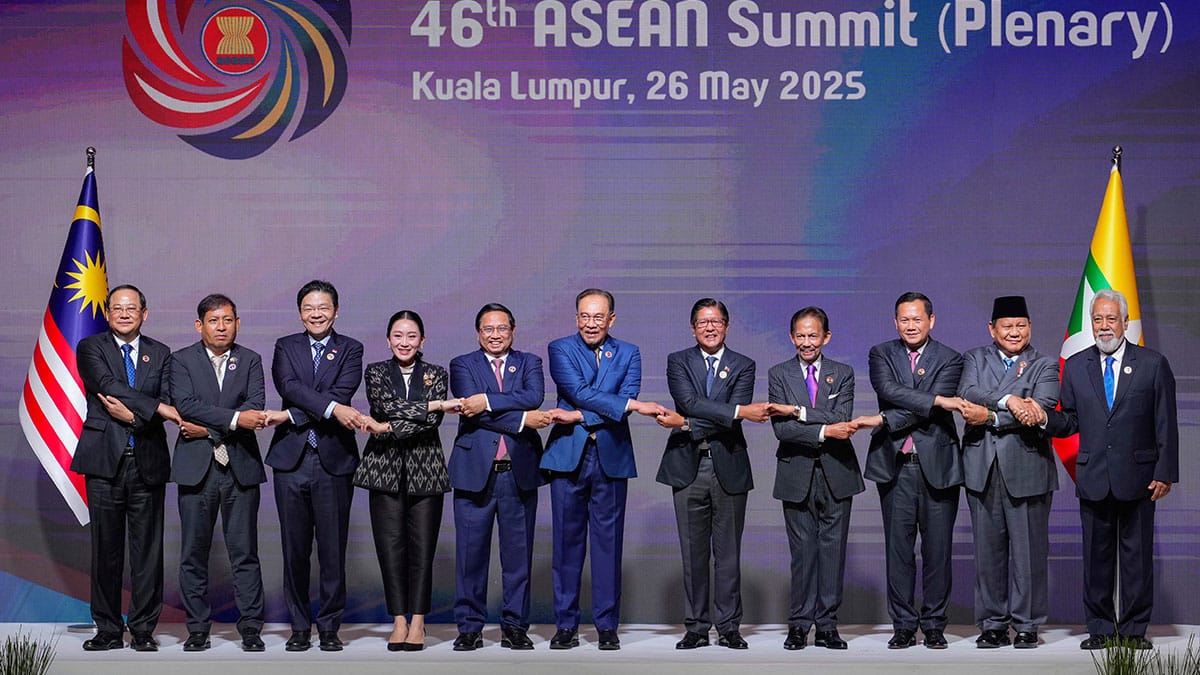Marcos to Asean peers: Adopt legally binding code for South China Sea

Asean leaders chain their hands while posing for a picture before the start of the plenary session at the Asean Summit in Kuala Lumpur, Malaysia, Monday, May 26, 2025. From left to right, Laos’ Prime Minister Sonexay Siphandone, Myanmar Permanent Secretary of the Ministry of Foreign Affairs Aung Kyaw Moe, Singapore’s Prime Minister Lawrence Wong, Thailand’s Prime Minister Paetongtarn Shinawatra, Vietnam’s Prime Minister Pham Minh Chinh, Malaysia’s Prime Minister Anwar Ibrahim, Philippine President Ferdinand Marcos Jr., Brunei’s Sultan Hassanal Bolkiah, Cambodian Prime Minister Hun Manet, Indonesia’s President Prabowo Subianto and East Timor’s Prime Minister Xanana Gusmao. ’AP Photo/Vincent Thian
KUALA LUMPUR, Malaysia — On the first day of the Association of Southeast Asian Nations (Asean) Summit on Monday, President Ferdinand Marcos Jr. formalized the Philippines’ call for the urgent adoption of a legally binding code of conduct to prevent the escalation of conflict in the hotly contested South China Sea (SCS).
The President forwarded the proposal in his intervention during the Asean Summit’s plenary session here, where he joined other leaders of the regional bloc in discussing issues and challenges of mutual concern.
“We underscore the urgent need to accelerate the adoption of a legally binding code of conduct in the South China Sea,” Marcos said, referring to the long-delayed Code of Conduct on the South China Sea that is seen to prevent major conflict in the disputed waterway.
READ: ‘We will proceed:’ Atin Ito unfazed by looming China radio threat
He said the adoption of the code of conduct, which the Philippines is hoping will be signed by 2026, is to “safeguard maritime rights, promote stability, and prevent miscalculations at sea.”
He pointed out that “geopolitical tensions,” such as the territorial dispute over the South China Sea, “have the potential to disrupt our communities, supply chains, and remove our hard-earned progress.”
The president appealed to other leaders of Asean member states for “deeper regional cooperation to address these emerging and transboundary challenges.”
“By working together, strengthening our institutions, and building the resilience and capacities of our people, we can better navigate this increasingly uncertain future and turn challenges into opportunities for shared growth and stability,” Marcos noted.
Chinese aggression
The president stayed true to his remarks during his departure speech on Sunday afternoon, where he vowed to tackle developments in the South China Sea dispute that involve China and a handful of Southeast Asian nations.
“I will continue to champion our advocacies in promoting an open, an inclusive, and rules-based international order, and for the peaceful resolution of disputes in accordance with international law,” he said before flying to Kuala Lumpur.
The president arrived at 8:41 a.m. at the Kuala Lumpur Convention Centre, venue of the Asean Summit meetings, and was welcomed by Malaysian Prime Minister Anwar Ibrahim.
Marcos’ remarks came in the wake of China’s latest act of aggression against the Philippines in the West Philippine Sea, or the part of the South China Sea that falls within Manila’s exclusive economic zone.
On Thursday last week, the China Coast Guard’s vessel marked 21559 blasted the Bureau of Fisheries and Aquatic Resources’ (BFAR) MMOV 3302 (BRP Datu Sanday) with water cannons and sideswiped the vessel, damaging its port bow and smokestack.
The incident happened near Pag-asa Cay 2 in the West Philippine Sea during BFAR’s marine scientific survey in the area.
The South China Sea is largely claimed by China, while the Philippines, Brunei, Indonesia, Malaysia, Vietnam, and Taiwan are claiming parts of the resource-rich water body.
In 2016, Manila won an arbitral award that junked Beijing’s nine-dash-line claim to the South China Sea, a ruling that China refused to recognize.
Outgoing Foreign Secretary Enrique Manalo earlier said the Philippines would seek to intensify negotiations on the code of conduct to adopt it by 2026. /cb/abc
For comprehensive coverage, in-depth analysis, visit our special page for West Philippine Sea updates. Stay informed with articles, videos, and expert opinions.


















